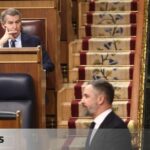
Poland and other countries bordering Ukraine have a “duty” to shoot down Russian missiles before they enter their airspace, despite NATO opposition, Polish Foreign Minister Radosław Sikorski said.
In an interview with the Financial Times, Sikorski said Warsaw had an obligation to ensure the safety of its citizens, regardless of fears that intercepting missiles on Ukrainian territory could embroil the Atlantic alliance in Russia’s war against Ukraine.
“NATO membership does not abrogate each country’s responsibility to protect its own airspace — it is our constitutional duty,” Sikorski said. “I personally believe that when hostile missiles are about to enter our airspace, it would be legitimate self-defense.” [abate-los]because once they cross our airspace, the risk of debris injuring someone is significant.”
Poland signed a bilateral security agreement with Ukraine earlier this summer, committing to examine the feasibility of intercepting missiles and UAVs fired towards Polish territory, following procedures agreed upon by the states and organizations involved.
However, outgoing NATO Secretary General Jens Stoltenberg rejected the proposal, saying it would put the alliance at risk of “becoming a party to the conflict”.
Sikorski insisted on his country’s right to intercept missiles after a suspected Russian drone crossed into Poland on August 26. Polish authorities are searching for the UAV, which may have landed on Ukrainian territory after possibly veering off course during a massive Russian missile attack on Ukraine.
Russian missiles have already landed in Poland since Moscow’s invasion of Ukraine in 2022, and Russian drones have also recently invaded Romanian airspace.
Sikorski stressed that the risk of Polish casualties increases the closer the missile is to its target when intercepted, so it would be preferable to shoot it down at a higher altitude, over Ukraine. “The Ukrainians told us: you’re welcome,” he added.
Some Western officials argue that such a policy would blur red lines on Western intervention and could prompt Russian retaliation. Kiev has been pushing its Western allies to become more involved in the war, including by providing air defense cover over western Ukraine from batteries located on NATO territory.
Ukraine has also repeatedly called on its allies to impose a no-fly zone over the country, but NATO has rejected those calls, saying it could put it in direct conflict with Russian forces.
Mircea Geoană, NATO’s deputy secretary general, told the Financial Times: “We have to do everything we can to help Ukraine while at the same time avoiding escalation. This is where NATO’s line has been consistent since the beginning of the war.”
“Of course, we respect the sovereign right of each ally to ensure its national security. But within NATO, we always consult before taking any action that could have consequences for all of us – and our Polish allies have always been impeccable in consulting the alliance,” Geoană added.
However, many Ukrainians are hopeful that NATO’s position will evolve.
“We saw that some red lines can be moved,” said Mykola Nazarov, a security analyst at the Globsec think tank in Kiev, referring to decisions by Western capitals to deploy long-range missiles, modern tanks and F-16 fighter jets.
“Ukrainians are putting a lot of pressure to allow Poland to intervene also because Ukraine does not have enough air assets to cover its entire territory, especially now in western Ukraine.”
Sikorski said it was too early to assess the military success of Ukraine’s incursion into the Kursk region of western Russia, which began on August 6. However, he praised the offensive as a way to surprise Russian President Vladimir Putin and show that “the victim does not always do what you expect.”
Sikorski added: “Not just Ukraine but the entire West must keep Putin off balance, and one of the mistakes we have consistently made is telling Putin in advance what we will and will not do — hence the outcome of this incursion.” [em Kursk] is much better than last year’s counteroffensive, which was so easy to predict and therefore prepare for.”
Ahead of the US presidential election, Sikorski suggested that European politicians should do more to convince the American public and its politicians that Europe is contributing significantly to international security.
“We have a good story to tell: not only are we spending more on defense, but we are actually spending more in Ukraine than the United States,” he said, adding military spending to the increased financial and humanitarian aid provided by Europe.
Via Financial Times
Source: https://www.ocafezinho.com/2024/09/02/polonia-desafia-otan-e-defende-abate-de-misseis-russos/

